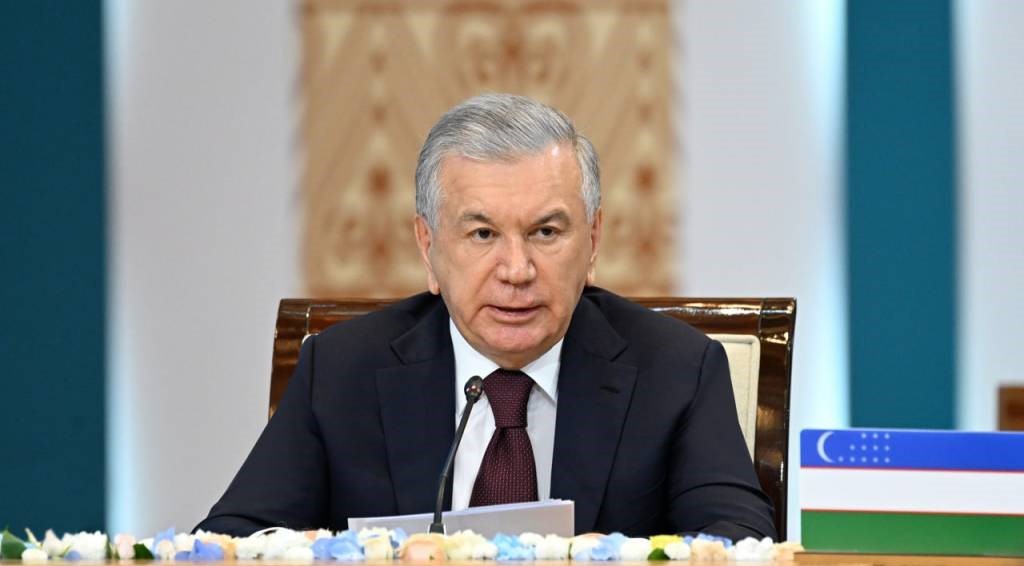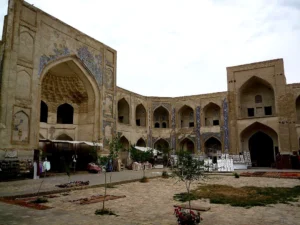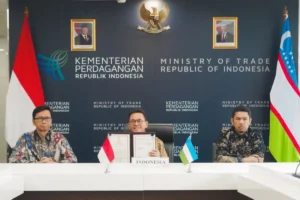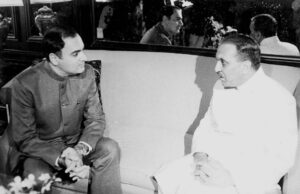Address by President Shavkat Mirziyoyev at the Second ‘Central Asia – Germany’ Summit

Astana, The Gulf Observer: President Shavkat Mirziyoyev, in his address at the Second “Central Asia – Germany” Summit, underscored the significance of deepening strategic partnerships with Germany, emphasizing mutual commitment to sustainable development, regional cooperation, and the advancement of shared initiatives in key sectors such as green energy, technological innovation, and socio-economic reforms.
Address by the President of the Republic of Uzbekistan, Shavkat Mirziyoyev, at the Second “Central Asia – Germany” Summit
Distinguished Heads of Delegations,
I am sincerely honored to greet you all today. Allow me to echo the words of gratitude to the President of the Republic of Kazakhstan, His Excellency Kassym-Jomart Tokayev, for the warm welcome and outstanding organization of our meeting.
I would also like to extend my heartfelt thanks to the distinguished Federal Chancellor of Germany, His Excellency Mr. Olaf Scholz, for his unwavering commitment to expanding the multifaceted partnership with the countries of our region.
Our initial meeting in Berlin and today’s summit reaffirm our shared intention to sustain an open and constructive dialogue and our focus on achieving tangible, practical outcomes. We are keen on establishing regular meetings in this format, while creating mechanisms for expert review and implementation of the initiatives we have proposed.
Distinguished Federal Chancellor,
We deeply value Germany’s steadfast support for the ongoing democratic transformations and socio-economic reforms in our countries, as well as its partnership and integration with Central Asia.
Our relationship has profound historical roots. In the 18th century, Handel, a great composer of the Enlightenment, composed one of his finest works, the opera “Tamerlane,” in a mere 20 days. The revered poet and philosopher Goethe dedicated numerous works to our ancient cities, the cradles of civilization.
Furthermore, at the beginning of the 20th century, a group of talented and progressive young people from Central Asia studied at prestigious German universities, later contributing significantly to the socio-economic development and enlightenment of our region.
Today, Germany remains a key partner as we strive to achieve our national goals of sustainable development.
Dear Colleagues,
Central Asia has undergone profound changes in recent years. We have established an open and productive dialogue and are independently resolving issues concerning borders, water, energy, trade, and transit. The Sixth Meeting of the Heads of State of the region was recently held in Astana, marking our progress.
Internationally, our region’s standing is strengthening, and cooperation with leading countries, particularly through the “Central Asia Plus” format, continues to expand. Trade, investment, freight transport, and tourism have all seen considerable growth.
We are discussing major regional projects in green energy and the development of transport infrastructure, exchanging experiences and technologies, and creating modern industrial and agricultural enterprises. Additionally, we are introducing financial instruments to stimulate further cooperation.
Most significantly, we are fully aware that the future security and sustainable development of our region depend on our political will and collective efforts.
We welcome the interest of our European partners, especially Germany, as a primary advocate of EU strategies and multilateral cooperation programs with our nations. We are also preparing for the next “Central Asia – European Union” summit in Uzbekistan next year, focusing on investment in the region’s future.
Distinguished Guests,
The global landscape presents numerous challenges, from conflicts and wars to sanctions policies and rising protectionism. These factors are putting immense pressure on our nations’ efforts to implement national programs and reforms.
At our earlier discussions in Samarkand, I shared my high expectations for today’s meeting with Chancellor Scholz. With that in mind, I would like to outline key directions for strengthening cooperation between Central Asia and Germany.
First, we place great importance on establishing a strategic regional partnership with Germany that ensures stability and prosperity. We propose the creation of a long-term partnership concept with program activities in priority areas. To this end, a “Central Asia – Germany” Forum of Analytical Centers could be established, with its first meeting in Khiva next year.
Second, we seek an expanded investment and technological partnership with leading German companies. Uzbekistan’s ongoing and planned projects with German firms currently exceed 20 billion Euros, encompassing sectors such as energy, agriculture, and transport logistics.
To further solidify these ties, I propose the development of a roadmap for investment cooperation and the establishment of a “Central Asia – Germany” Council of Investors and Entrepreneurs, with its inaugural meeting in Uzbekistan at the Tashkent Investment Forum next year.
Third, Central Asia’s rich mineral resources offer vast opportunities for cooperation in critical raw materials. We encourage German companies to participate in geological survey projects and mineral processing, as well as the shipment of high-value products to Germany and the EU.
Fourth, in the field of green energy, we propose launching an Energy Dialogue between Central Asia and Germany. This initiative would involve our energy ministries, companies, and scientific organizations, and could lead to the development of capacity-building programs in the low-carbon economy.
Fifth, climate change remains a pressing issue for our region. We appreciate Germany’s assistance in environmental projects through the “Green Central Asia” program. We are keen to implement joint educational programs, introduce advanced water management technologies, and contribute to the proposed Central Asian Nature Partnership.
Sixth, transportation connectivity is vital for deeper regional cooperation. We request Germany’s support in involving European institutions to develop alternative transportation corridors between Central Asia and Europe. We propose holding a joint ministerial conference next year to improve transit capacity.
Dear Heads of Delegations,
The exhibition of Central Asia’s cultural and historical heritage at Berlin’s Neues Museum last year highlighted the need for regular cultural exchanges. We suggest adopting a joint plan for cultural activities, including Central Asian art and film days in Germany, and expanding partnerships between museums.
In the scientific field, we aim to enhance university partnerships and teacher training programs with German institutions like the Goethe Institute. The recent victory of an Uzbek schoolgirl at the World Olympiad in Göttingen reflects the strong interest in German studies among our youth.
Finally, we must continue close cooperation with Germany in countering terrorism, extremism, and cybercrime. Central Asia’s security is closely tied to the situation in Afghanistan. We are ready to collaborate with Germany in regional economic initiatives and vocational training for Afghan citizens, especially girls and women, at our Educational Center in Termez.
In conclusion, Uzbekistan is eager to harness the full potential of its multifaceted cooperation with Germany and Central Asia. I am confident that today’s meeting will strengthen our ties and pave the way for meaningful projects and initiatives.
Thank you.


